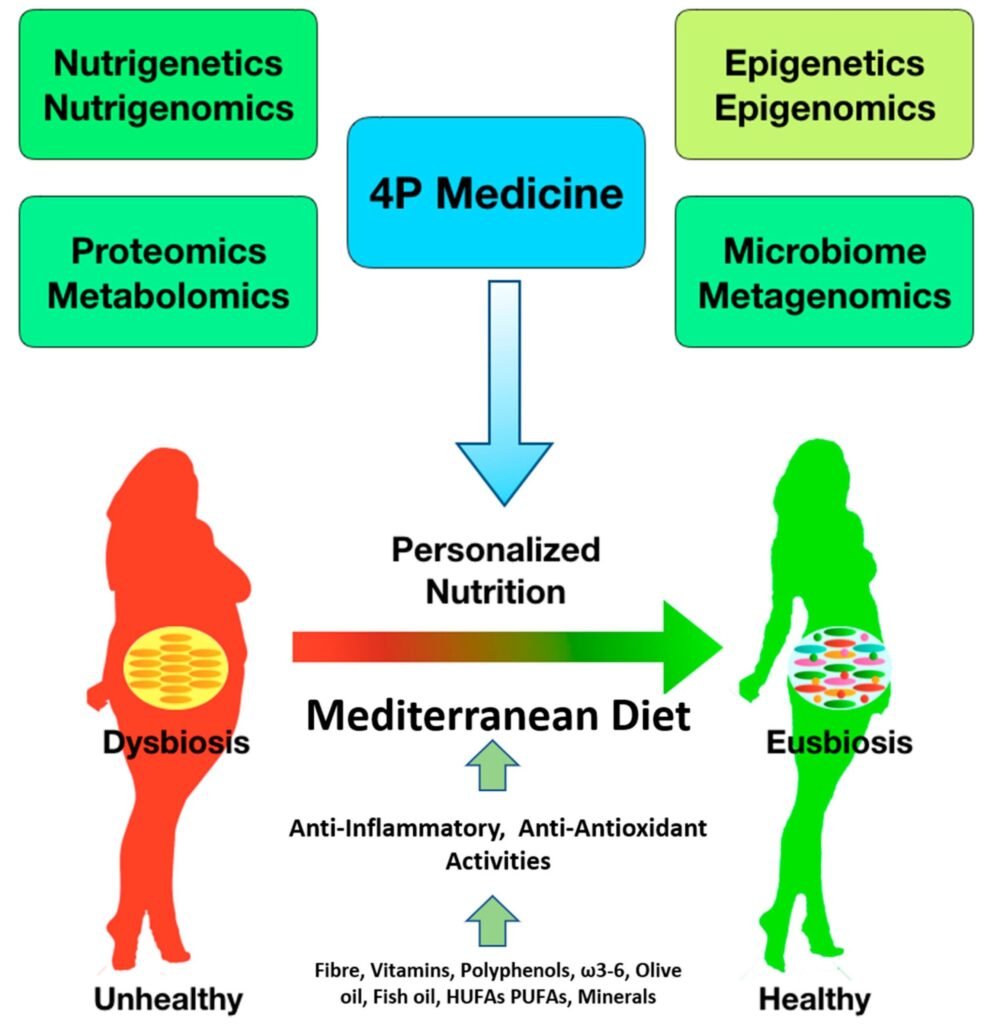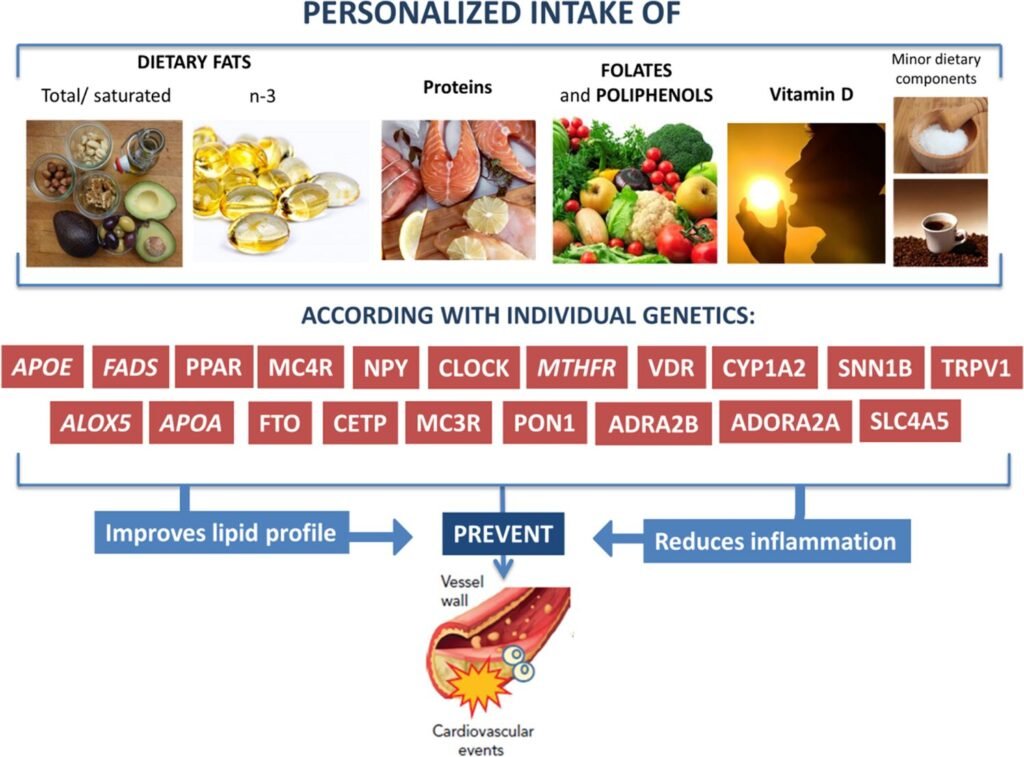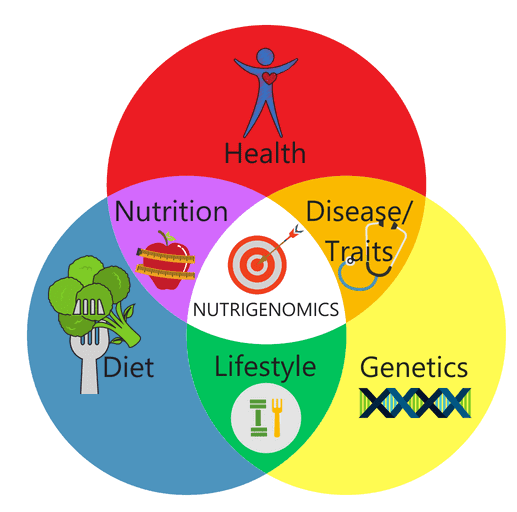In the field of genetics, personalized nutrition has become a significant area of exploration through the study of nutrigenomics. Understanding how our genetics influence our individual responses to diet is key in optimizing our health outcomes. This article delves into the intricate relationship between genetics and nutrition, exploring the applications, challenges, and future prospects of nutrigenomics. By deciphering the interplay between genes and dietary factors, we can customize dietary plans to optimize health, inform targeted interventions for preventing and managing diseases, and even enhance athletic performance. However, ethical considerations and accessibility issues must be addressed, and advancements in technology and public education are crucial in realizing the full potential of nutrigenomics. So, if you are passionate about genetics and its implications for personalized health and nutrition, a career in this field may be a highly rewarding choice.

This image is property of www.mdpi.com.
Understanding Nutrigenomics
Definition and Scope of Nutrigenomics
Nutrigenomics is a field of study that focuses on understanding how genetic variations impact an individual’s responses to diet. It examines how specific genes influence how the body processes and responds to nutrients, and how this knowledge can be used to personalize nutrition strategies for optimal health outcomes. By analyzing an individual’s genetic profile, nutrigenomics aims to provide personalized dietary recommendations that take into account their unique genetic makeup.
Gene-Diet Interactions
Gene-diet interactions refer to the intricate relationship between genes and dietary factors. Certain genes can affect how the body metabolizes and utilizes different nutrients, which can vary from person to person. These variations can influence factors such as nutrient absorption, metabolism, and utilization, and can ultimately impact health outcomes. Understanding these interactions is essential in designing personalized nutrition plans that cater to an individual’s specific genetic needs.
Key Concepts in Nutrigenomics: Gene Expression and Epigenetics
Gene expression is the process by which information stored in our genes is utilized to produce proteins and molecules that carry out various functions in the body. Nutrigenomics focuses on how dietary factors can influence gene expression, either by activating or suppressing certain genes. By understanding how specific nutrients can influence gene expression, tailored dietary interventions can be designed to optimize health outcomes based on an individual’s genetic profile.
Epigenetics is another key concept in nutrigenomics. It refers to changes in gene expression that are not caused by changes in the underlying DNA sequence but rather by modifications to the genes themselves. These modifications, such as DNA methylation or histone modification, can be influenced by dietary factors. Epigenetic changes can play a significant role in health outcomes and can be modified through targeted nutritional interventions. Understanding epigenetics is crucial in unraveling the complex interplay between genes and diet.
Applications of Nutrigenomics
Health Implications of Nutrigenomics
One of the primary applications of nutrigenomics is in optimizing health outcomes through personalized nutrition plans. By considering an individual’s genetic profile, dietary recommendations can be tailored to their specific needs. This customization can help identify optimal nutrient intake, address potential nutrient deficiencies, and mitigate the risk of developing diet-related health conditions. Nutrigenomics empowers individuals to make informed dietary choices based on their unique genetic makeup, thereby promoting overall health and well-being.
Disease Prevention and Management Through Nutrigenomics
Nutrigenomics has significant implications for disease prevention and management. By analyzing an individual’s genetic profile, healthcare professionals can identify genetic variants associated with increased risk for conditions such as obesity, diabetes, and cardiovascular diseases. This information can then be used to develop targeted dietary interventions to mitigate these risks. Nutrigenomics can also help in the identification of individuals predisposed to adverse reactions to certain foods, allowing for the prevention of potentially harmful dietary choices.
Performance Enhancement Through Nutrigenomics
Athletes and individuals involved in sports can benefit from the application of nutrigenomics in optimizing performance and recovery. By understanding an individual’s genetic predispositions, personalized nutritional strategies can be developed to enhance athletic performance. Nutrigenomics can provide insights into an individual’s nutrient requirements, optimization of macronutrient composition, and identification of potential areas of improvement, such as nutrient absorption or utilization. These personalized approaches can lead to improved performance, faster recovery, and reduced risk of injuries.
Challenges and Limitations
Ethical Considerations in Nutrigenomics
As nutrigenomics involves analyzing an individual’s genetic information, ethical considerations arise regarding privacy, consent, and potential misuse of genetic data. Safeguarding individuals’ genetic information is crucial, and appropriate measures must be taken to ensure privacy and confidentiality. Additionally, the ethical use of genetic information in personalized nutrition requires informed consent from individuals, ensuring they understand the implications of genetic testing and the potential impact on their dietary choices and health outcomes.
Access and Affordability of Nutrigenomics Services
Access to nutrigenomics testing and personalized nutrition services can be a challenge for certain populations. Cost considerations and limited availability may hinder the widespread adoption of nutrigenomics in healthcare. Ensuring equitable access to these services is essential to make personalized nutrition strategies accessible to everyone, regardless of socioeconomic status. Efforts should be made to address the barriers to access and increase the affordability of nutrigenomics testing and services.
Complexity of Gene-Diet Interactions
The field of nutrigenomics is complex due to the intricate interplay between genes and dietary factors. Gene-diet interactions involve multiple genes and various dietary components, making it challenging to decipher the specific mechanisms and relationships. The current understanding of gene-diet interactions is still evolving, and research methodologies are continually being refined. The complexity of these interactions emphasizes the need for further research and collaboration across disciplines to enhance our understanding of personalized nutrition.
Future Directions and Opportunities
Technology Advancements Impacting Nutrigenomics
Advancements in technology, such as advanced sequencing techniques and artificial intelligence, hold immense potential for advancing nutrigenomics research and applications. These technological advancements enable more precise and cost-effective genetic testing, allowing for broader access to nutrigenomics services. Additionally, artificial intelligence can aid in the analysis and interpretation of vast amounts of genetic data, leading to more accurate personalized nutrition recommendations. Continued investments in technology are likely to reshape the landscape of nutrigenomics and its integration into healthcare.
Integration of Nutrigenomics into Healthcare
The integration of nutrigenomics into mainstream healthcare practices has the potential to revolutionize preventive medicine and wellness programs. By incorporating genetic information into healthcare assessments, healthcare providers can offer targeted dietary interventions and personalized nutrition plans. This integration can enhance the precision and effectiveness of healthcare strategies, addressing individual needs and minimizing the risk of adverse health outcomes. Educating healthcare providers and promoting interdisciplinary collaboration are essential steps in realizing the full potential of nutrigenomics in clinical practice.
Public Education and Awareness About Nutrigenomics
Public education and awareness about nutrigenomics are crucial for its widespread adoption and application. Empowering individuals with knowledge about the role of genetics in personalized nutrition can enable them to make informed dietary choices and take control of their health. Public education initiatives should focus on providing accurate information, dispelling myths, and highlighting the potential benefits of nutrigenomics. By fostering public understanding and awareness, individuals can actively participate in their own health management and contribute to the advancement of personalized nutrition.

This image is property of media.springernature.com.
Genetics in Personalized Nutrition
Role of Genetics in Nutritional Response
Genetics plays a significant role in how individuals respond to different nutrients. Variations in genes can impact nutrient absorption, metabolism, and utilization, thereby influencing individual nutritional needs and responses. By analyzing an individual’s genetic profile, insights can be gained into their specific nutritional traits, such as nutrient deficiencies or increased nutrient requirements. This genetic information can then inform personalized nutrition plans that address these specific needs, optimizing health outcomes and overall well-being.
How Genetics Influences Dietary Guidelines
Traditionally, dietary guidelines have been based on population-level data, providing general recommendations for the general public. However, variations in genetic makeup can affect how individuals respond to these guidelines. Genetics can contribute to differences in nutrient requirements, sensitivities, and tolerances, leading to varying responses to dietary interventions. Recognizing the impact of genetics on dietary responses can help refine dietary guidelines, making them more personalized and effective for individuals.
Understanding Genetic Variations in Nutritional Needs
Genetic variations can significantly impact an individual’s nutritional needs. These variations can influence the body’s ability to absorb, metabolize, and utilize specific nutrients. For example, certain genetic variants may affect the production or activity of enzymes responsible for nutrient metabolism, leading to altered nutrient requirements. Understanding these genetic variations allows for personalized nutrition plans tailored to an individual’s unique needs, ensuring optimal nutrient intake and avoiding potential nutritional imbalances.
Popular Nutrigenomics Tests
Genetic Tests for Nutrient Utilization
Genetic tests for nutrient utilization analyze an individual’s genetic profile to assess their ability to metabolize and utilize specific nutrients. These tests can identify genetic variations that may affect nutrient absorption, metabolism, or utilization. By understanding an individual’s genetic predispositions, personalized dietary recommendations can be developed to optimize nutrient utilization. This information can also contribute to the identification of potential nutritional deficiencies or increased nutrient needs, allowing for targeted interventions.
Predicting Food Intolerance and Sensitivity Through Genetics
Food intolerances and sensitivities can be influenced by genetic factors. Genetic tests can assess an individual’s genetic profile to identify potential genetic variants associated with food intolerances or sensitivities. By understanding these genetic predispositions, personalized dietary recommendations can be made to avoid or minimize exposure to triggering foods. This approach can help individuals manage their food intolerances more effectively, promoting overall gastrointestinal health and well-being.
Genetic Insights into Weight Management
Genetic tests can provide insights into an individual’s genetic predisposition for weight management. Certain genetic variants may influence factors such as metabolism, appetite regulation, or fat storage, impacting an individual’s ability to manage their weight. By understanding these genetic variations, personalized dietary and lifestyle recommendations can be developed to support weight management goals. This tailored approach takes into account an individual’s unique genetic makeup, optimizing the effectiveness of weight management strategies.

This image is property of foodnwellness.com.
From Nutrigenomics to Nutriepigenomics
Redefining Nutrigenomics with Epigenetics
Nutrigenomics is evolving to incorporate the field of epigenetics, giving rise to the term nutriepigenomics. This expansion recognizes the role of epigenetic modifications in mediating the relationship between diet and gene expression. Nutriepigenomics explores how dietary factors can influence epigenetic changes, modifying gene expression patterns that can impact health outcomes. By considering both genetic and epigenetic factors, personalized nutrition strategies can be developed that take into account the dynamic interactions between genes, diet, and epigenetics.
Nutrient Influence on Gene Expression
Nutrients can play a crucial role in modulating gene expression through epigenetic mechanisms. Certain dietary factors, such as specific micronutrients or bioactive compounds, can influence the addition or removal of epigenetic marks on genes. These epigenetic modifications can alter gene expression patterns, potentially impacting health outcomes. By understanding how nutrients can influence gene expression, tailored dietary interventions can be designed to optimize gene expression profiles, promoting overall health and well-being.
Nutriepigenomics: The Next Big Thing in Personalized Nutrition
Nutriepigenomics represents the next frontier in personalized nutrition. By integrating the knowledge from both nutrigenomics and epigenetics, nutriepigenomics aims to provide a more comprehensive understanding of the intricate relationship between diet, genes, and epigenetics. This holistic approach has the potential to revolutionize personalized nutrition strategies, enabling a deeper understanding of individual response to dietary interventions. The emerging field of nutriepigenomics holds promise for unlocking new avenues for customization and optimization of nutrition plans based on an individual’s genetic and epigenetic makeup.
Clinical Application of Nutrigenomics
Personalized Diet Plans Based on Genetics
In clinical settings, nutrigenomics can be utilized to develop personalized diet plans based on an individual’s genetic profile. By analyzing an individual’s genetic variations related to nutrient metabolism, dietary recommendations can be tailored to optimize nutrient utilization and address specific nutritional needs. Personalized diet plans can also consider genetic variants associated with food intolerances or sensitivities, avoiding triggering foods. This approach facilitates a more targeted and effective management of dietary-related conditions, enhancing health outcomes.
Tailoring Nutritional Therapies for Chronic Diseases
Nutrigenomics can inform the development of tailored nutritional therapies for chronic diseases. By analyzing an individual’s genetic profile, healthcare professionals can identify genetic variants associated with increased risk for specific diseases. This information can guide the development of personalized nutrition interventions aimed at mitigating these risks and managing the conditions. Nutrigenomics allows for a more precise targeting of dietary approaches, promoting optimal health outcomes and better disease management.
Nutrigenomics in Disease Prognosis
Nutrigenomics can play a role in disease prognosis by identifying genetic variations that may impact disease progression and treatment response. Certain genetic variants can influence an individual’s response to specific dietary interventions or nutritional therapies. By understanding these genetic variations, healthcare professionals can make more informed predictions about disease outcomes and tailor nutritional strategies accordingly. Nutrigenomics can contribute to personalized disease management plans, improving prognostic accuracy and optimizing treatment outcomes.

This image is property of medriva.com.
Practical Considerations for Implementing Nutrigenomics
Understanding the Risks and Limitations
Implementing nutrigenomics requires a comprehensive understanding of the risks and limitations associated with genetic testing and personalized nutrition assessments. Genetic testing may have limitations in terms of accuracy and interpretation. Healthcare professionals and individuals should be aware of these limitations and consider the potential risks and benefits before opting for genetic testing. Adequate counseling and education are essential to ensure individuals have realistic expectations and a clear understanding of the implications of their genetic information on their dietary choices and health outcomes.
Factors Influencing the Effectiveness of Personalized Nutrition
The effectiveness of personalized nutrition strategies can be influenced by various factors. Genetic variations are just one piece of the puzzle, and other factors, such as lifestyle, environment, and overall health status, also play a critical role. It is important to consider these factors when developing personalized nutrition plans and interventions. A holistic approach that looks beyond genetics is necessary to optimize personalized nutrition outcomes and promote overall health and well-being.
Practical Challenges in Applying Nutrigenomics
The practical application of nutrigenomics can face certain challenges. The availability and accessibility of nutrigenomics testing and services may vary across different regions and populations. Cost considerations and limited availability may hinder the widespread adoption of nutrigenomics in healthcare. Additionally, healthcare professionals may require specialized training and resources to effectively integrate nutrigenomics into clinical practice. Addressing these challenges will be essential to ensure that personalized nutrition approaches can be implemented more widely and effectively.
Conclusion
Recap of Nutrigenomics
Nutrigenomics is an evolving field that explores the intricate relationship between genetics and nutrition. It focuses on understanding how genetic variations impact an individual’s responses to diet and aims to develop personalized nutrition strategies based on this knowledge. By considering an individual’s genetic profile, personalized dietary recommendations can be made to optimize health outcomes and address specific nutritional needs.
Importance of Continued Research and Education
Continued research and education are crucial to further unlock the potential of nutrigenomics. Advancements in technology, such as advanced sequencing techniques and artificial intelligence, hold promise for enhancing the field and expanding its applications. Integrating nutrigenomics into healthcare practices and public education initiatives can empower individuals to make informed dietary choices and actively participate in their health management.
Future of Health and Nutrition Through Nutrigenomics
Nutrigenomics has the potential to revolutionize the future of health and nutrition. By integrating genetic information into personalized nutrition strategies, healthcare professionals can develop targeted interventions and optimize health outcomes. The emerging field of nutriepigenomics, which considers both genetics and epigenetics, offers a more holistic understanding of the complex interactions between diet, genes, and health. Continued research, education, and integration into healthcare systems are vital in realizing the full potential of nutrigenomics and shaping the future of personalized nutrition.



